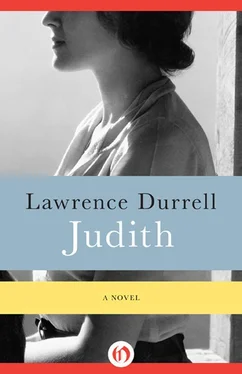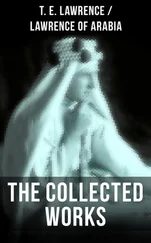Lawton stood up and, feeling somewhat uncertain of himself, contented himself with a gruff “Good evening” and a short nod of the head.
The priest advanced with an air of uncertainty into the centre of the room and concentrated his glance upon Grete.
“I have some news for you,” he said.
“News?”
“I wonder if I might talk to you,” he said. “I was called to confess a man called Schiller late last night.”
The words had a mesmeric effect upon Grete. She rose from her seat white-faced and anxious. The little priest still smiled with his head on one side. His presence radiated a sort of doll-like composure. Lawton noticed his dusty little toes in their worn sandals.
“I think,” said the little man, “it would be better if I could see you alone for a few moments.”
Lawton took his point and instantly said:
“Of course. I shall be on my way. Good-night, Grete.”
“Oh, don’t run away,” said Father Gaudier. “What I have to say will not take long.”
But Lawton, despite his curiosity, gave them a cheerful “That’s all right” and closed the front door of the flat behind him, to leave the two of them alone.
Grete had clasped her hands in front of her body as she stared fixedly into the blue eyes of the priest. Father Gaudier, as if with a subconscious intention of reducing her obvious anxiety at what he might be about to reveal, came softly towards her and put two fingers of his right hand on her wrist. As if by his impulsion, she sat down once more and the priest took his place beside her, with his fingers still upon her hand.
“What did he tell you?” she managed at last to get out.
“May I smoke?” asked Gaudier humbly in a low voice.
“Of course.”
He helped himself to a cigarette from the enamel box on the table before them and thoughtfully blew a streamer of smoke into the air where it hung, slowly dispersing.
“He told me,” he said in a small, unemotional voice, “everything he could about his life and about yours. He committed many grievous sins, my dear, and like all sinners was more to be pitied than hated.”
“He promised to tell me about the child,” said Grete, in a voice which had a hysterical edge to it.
“Almost the only thing he did not tell me,” said Father Gaudier with an air of pensive reproach, “was that he intended to commit suicide.”
“And even that did not make sense,” she cried bitterly. “It was simply to cheat me. I knew the child was alive somewhere.”
The priest coughed behind his hand, doubling it up into a grubby little paw.
“That is what I came to talk about,” he said. “It is very cruel and very ugly and will cause you great suffering, but from what he told me I know that beyond a shadow of a doubt your child is dead. In fact he asked me to tell you.”
The centre of numbness in the middle of her mind gradually overflowed to encompass her whole body. It overflowed like ink or blood on her carpet and she felt spreading through her a slowly expanding stain of something like amnesia. The phrase had turned her into a pillar of salt.
The little priest did not take his eyes from her face.
“If I tell you that he showed remorse,” he said, “I would not expect you to believe it; indeed, I hardly know whether to believe it myself. With a man so complicated it is always difficult to determine these things. He himself would not have been able to tell us whether he was play-acting or not. He somehow did not know where to find his own feelings or how to interpret them.”
Grete was not really listening, but she was grateful for the sound of his low voice and the cool sympathetic feel of his fingers on her wrist. The priest sighed and went on, almost as if he were talking to himself:
“It makes one wonder whether the consciousness of good and evil is the fruit of instruction or whether it’s inherited like an instinct. Nobody can answer this one. Are there people born without souls? I have met a few people who made me almost believe it — almost, but not quite.”
“Can a man who believes in nothing believe in God?” she asked bitterly. “Or rather, could a man who believed in the Nazi party do so?”
Father Gaudier shook his head with a puzzled air, as though all these questions belonged somehow to the rhetoric of theology which was outside the orbit of ordinary human actions.
“The human heart,” he said helplessly, as if confronting the central enigma of his own profession. “It has no bottom, it has no top, no centre and no sides.”
Holding her voice very steady, and wearing an artificial expression of composure, she said:
“You’re sure about the child…
“Completely sure,” he replied.
She got up, and very slowly walked across the room towards the window where the night sky still danced and flickered over the newly-born Israel. Her numbness had intoxicated her and had conveyed a kind of slow unsteadiness to her walk, which was the walk of drunkenness or pregnancy. She turned suddenly and looked across the room at Father Gaudier, who still watched her, head on one side like a diminutive spaniel.
“My God, how strange,” she said. “After so many years of longing and wondering, all I can feel now is an intense relief. Would you have expected that?”
“Yes,” said the priest.
“I feel so ashamed,” she said.
The priest stubbed out his cigarette and said in his level voice:
“You’ll begin to cry tomorrow — or the day after. Perhaps even next week. Or next year. Just now it is all over and you’re free from an incubus. Isn’t that so?”
“And yet a door has closed on everything I care about,” she said.
The priest stood up and flicked some ash off his soutane with his fingers.
“No door can shut,” he said, “without another opening somewhere. Life is beautifully arranged. Or perhaps I should say a devilishly well-organized affair.”
“Look,” said Grete… “I must know how it happened, where, when. I must .”
“Typhoid… Dachau,” said the little man.
The ADC opened the side door and admitted Lawton to the gallery which ran around the reception rooms of Government House.
“H.E.’s out on the terrace,” he said.
Lawton followed him across the long room with its blazing chandeliers and heavy pile carpets. The long mirrors reflected back his lean form with its nervous long hands and preoccupied face.
“I think,” said the ADC, “H.E. is going to make honourable amends.”
“For what?” said Lawton in surprise.
“Well, for having disregarded all your political analyses of the last year. You’ll be able to say ‘I told you so’ with a vengeance. That will be pleasurable, no?”
“No pleasure at all,” said Lawton curtly.
H.E. was sitting on the terrace, staring thoughtfully at the firework display which still burst and scattered over Jerusalem. The aroma of his Juliet hung in the still night air.
“Ah, there you are,” he said pleasantly. “Come and sit down.”
He vaguely indicated a soda siphon and bottles on a side table and Lawton, according to long-established custom, crossed to make himself a drink, saying as he did so:
“I’m sorry about the rush, Sir. I didn’t expect to go on such short notice. The cable came through this afternoon and I’m to leave tomorrow.”
“So I understand,” said H.E. Then he added awkwardly, “I’m afraid you must think I’ve been rather a doubting Thomas… I mean, about your Intel reports.”
Lawton sat down and said equably:
“Political judgment is a queer thing. I could easily have been wrong, Sir, and you right.”
“Yes,” said H.E. handsomely, “but it’s my duty to be right, d’you see? And I was wrong.”
Читать дальше












